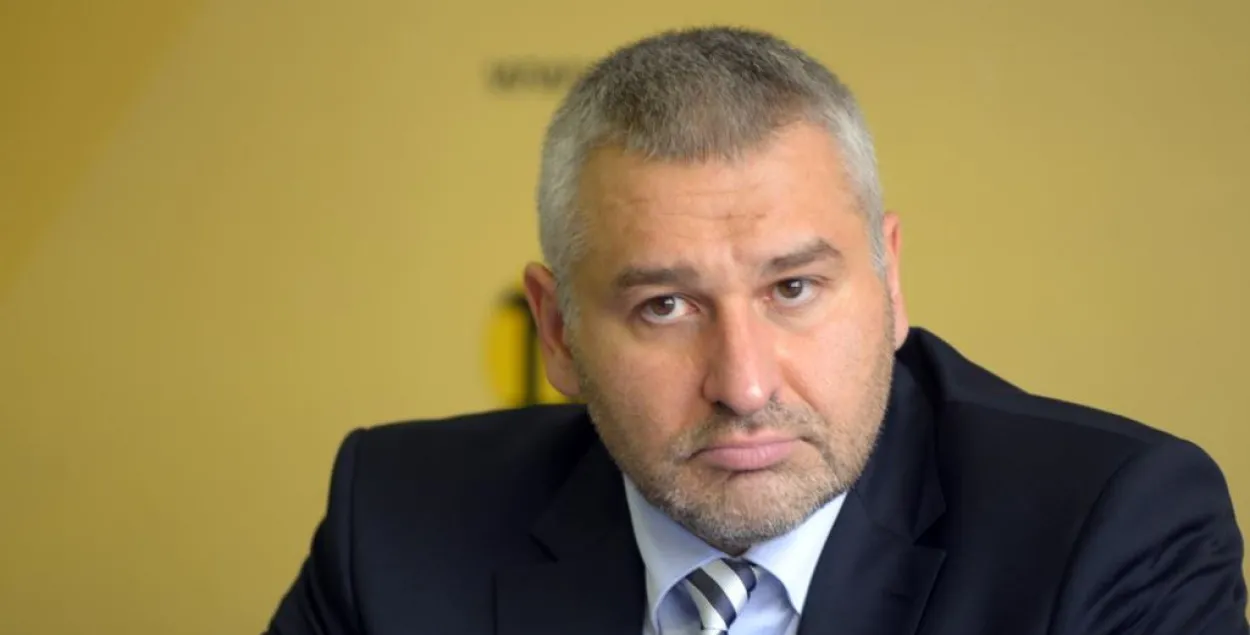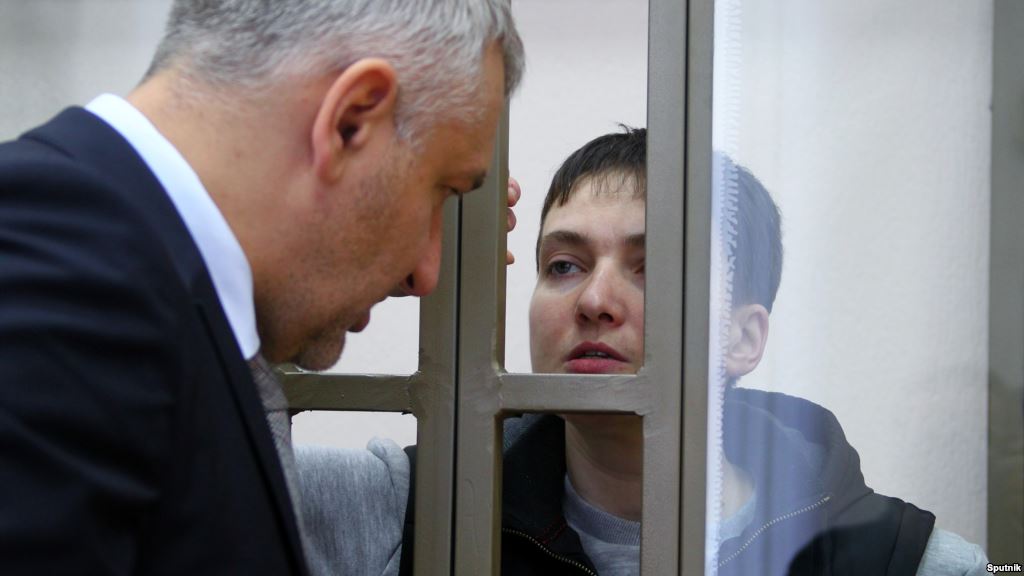Savchenko's attorney: No place for Lukashenka in Savchenko negotiations

Euroradio info: Mark Feigin - a lawyer and a politician, a former deputy of the Russian State Duma, vice-mayor of Samara. In 2012 he became one of the 20 most influential lawyers according to GQ magazine. Former defence lawyer of Pussy Riot.
Euroradio: Are you satisfied with the result of the "Savchenko case"?
Mark Feigin: Exchange was the only possible solution to free Nadiya from punishment, as serving sentence at home under the Convention "On Extradition of Convicts" or a pardon was the only way to save her from a Russian prison. This is very important. Some talk like perfectionists, "How is that possible: pardon by third parties - the victims' relatives. Putin came up with some scheme for self-benefit". I think when it comes to political affairs in the country with no independent judiciary and an independent judicial system, any attempt to save the accused for political reasons may appear in any legally-procedural form. After all, the reasoning of "Let's fight until the end, to the defendant's last drop of blood" seem to me absurd and unfair, and also untrue. The main thing is the result. Not "justify or not justify" or in some other way, using procedural terminology, succeed in the case, but save. In the political affairs, the issue is not "won - lost" - this is not the English Court, but saved or not. So, Nadiya Savchenko was saved, unlike Karpyuk who was tortured, Sentsov who was tortured: FSB guys pulled a sack on his head in Crimea. Unlike many others, who got in much more serious situation than Nadiya, thanks only to the political aspect and publicity of the case. That's why I think this result is satisfactory, since we rescued her.
Euroradio: How did you know that the exchange would actually happen?
Mark Feigin: Details were not known until the last moment -- I did not know them. And it is natural: those were the conditions of the special operation. I think the first persons agreed, and one of the conditions was that all remained quiet. I was told that all would happen on Wednesday by the people from Kyiv on the day before the exchange. To be honest, I did not believe until the last, because I was skeptical about the possibility of such an option due to the behavior of the Russian authorities. while the Ukrainian president commented on all that he did in that case, the Russian authorities remained silent, leaving for themselves an option to cancel the agreement at any time, because they had been reached non-publicly.
Euroradio: How did Savchenko learn about the exchange?
Mark Feigin: I just came to Kyiv, I'll meet with her, and she will tell me the details of how it was presented by the prison. After all, we saw her last week when nothing was known, and none of her attorneys could get to her this week. But I think that in prison she was told about the exchange on the very day, did not warn her in advance.

Euroradio: Is it known if Lukashenka was a mediator in these negotiations?
Mark Feigin: I do not think so. In this trade, Putin deals with those of whom he can get at least something. Merkel and Hollande are more suited to the role of intermediaries. But we do not know all the details of the negotiations. In fact, Hollande announced that the last exchange details were agreed upon at the last moment over the phone between Putin and members of the Normandy format. Lukashenka had no place in these talks, if only because the negotiations had "direct nature": France and Germany offered something to Putin. But we will not know what until it starts to be implemented, because at this level politicians keep it confidential - this is a common practice. We will understand this at the time, for example, of the next Normandy format negotiations or during "Minsk talks".
Euroradio: On the Kremlin's benefit: a Russian analyst wrote that Savchenko is more beneficial to Moscow in Parliament than in the Russian prison ...
Mark Feigin: I'm not a political scientist, but I am well versed in politics, I was once a member of parliament. I believe that the arguments on "profitable - unprofitable," "she will come, and there will be early elections," "she is a woman of sharp opinion, and it will finally destroy the political field in Ukraine" - it's all on the level of chatter. These are close to the Kremlin ideas for self-justification. We sometimes hear: "We will never let out a murderer!", then "See how profitably we sent Savchenko to Ukraine, and she will make an effect there" - the concept varies according to the situation for the Kremlin to be in a better position. They put her in jail to show that you can not put pressure on Putin, and Putin released her because "he has a cunning plan - to spoil the entire political stage of Ukraine so that chaos spawned a desire to return to the past." But Savchenko, in my opinion, came not destroy the statehood of the country, but to build it. And her personal prospects will depend on how her political life will develop. There is always a risk: it may happen or it may not. In free conditions it is impossible to predict something at 100%. It is only possible to predict the Russian politics, where nothing happens: a single leader has been in power for 16 years with puppets in parliament changing. The unpredictability of political democracy is, on the one hand, a disadvantage, but on the other - a benefit. It is a value that you want to use and keep, for the so-called stability and predictability is, as history shows, not very good.
Euroradio: How did work with Savchenko impact your career, communication with colleagues?
Mark Feigin: I have taken up political cases before: I worked on the sensational case of Pussy Riot. The hatred of the so-called public opinion, which is formed by the Kremlin's propaganda, was not something unexpected for me. In a totalitarian system, when you go against it and the authoritites, you will always be a pariah. Therefore it did not become worse than before

Euroradio: But there you defended your own, Russians, and here is a Ukrainian, a "fascist" and a "killer"...
Mark Feigin: Yes, it was dramatic due to the war. Savchenko is a symbol of the war between Russia and Ukraine. But when in 2012 there was a case of "Pussy Riot", the authorities launched quite a strict clerical sentiment in society. The song was directed against the authorities. Another thing is that it was all a show. As to the thesis of "us vs. them," it was not an argument for the Russian authorities -- they "crush" all the parties alike. Both them and Nadiya were innocent. But the authorities solve its tasks, including the propaganda matters by such cases - it mobilizes the masses for their utilitarian purposes. From this perspective, my life changed little. But I did lose many people. However, the problem here is not the "Savchenko case" but in the war of Russia and Ukraine. Russia's imperial role in Donbas and in Crimea drives people apart inside of Russia. A small part would not accept the occupation of neighboring lands and bullying of neighbors, others succumbed to imperial hysteria and turned away from me - it's true.
Euroradio: Do you have plans for the future? Maybe you will help save Sentsov from a Russian prison?
Mark Feigin: That case is complete, people were sentenced doomed, and there is no point in taking up cases like this. They procedural part there is over, and the work ahead is political, diplomatic, work to mobilize international public opinion and foreign politicians, so that they would continue the pressure and have Sentsov, Karpyuk and the rest sent to Ukraine. Perhaps I will take up this work, but I want to do it together with Savchenko. After all, it seems to me, she will become the frontperson of this policy. At the same time, I represent Mustafa Dzhemilev - I am in litigation with the FSB. I have enough cases and appeals, but it is impossible for one person to do everything. My task is to create a methodology of political protection, which will benefit other lawyers. Let them follow this line throughout Russia, as it gives a result in the fight against the non-existent justice. It is important to achieve the emergence of at least some justice sustem as a result of this struggle.

Euroradio: Did you think about leaving Russia, moving your law practice, for example, to Ukraine?
Mark Feigin: I do not want to leave. There would simply be another political refugee, a man who would do someone else's job, what of it? Doesn't Ukraine have enough lawyers of its own? I do not want to eat someone else's bread. It is more useful for me to stay in Russia and continue to do my work. The situation is indeed becoming increasingly harsh, many people leave, and I have helped many others to leave. But if people like me also leave, it will be too bad. Yes, I was strongly criticized in Russia under the influence of propaganda, they say that I myself politicize the situation: "Savchenko was actually a killer, and you made a political prisoner out of her". But there are some people who really do not understand how it all works: they think that if there is exculpatory evidence presented, the court must take a fair decision in the political case. They do not realize that our court is, in principle, "deaf" to the adoption of fair decisions in such cases and do not understand why the case was given such a loud international resonance. But I still do not want to leave Russia.
Euroradio: And they probably also say that you did not just "politicize the case," but, perhaps, took up the Savchenko case "only because the Kyiv junta paid you well!"
Mark Feigin: When on July 11, 2014 I received a call from Vera Savchenko, nobody wanted to take up this case - it was radioactive and toxic. Lawyers get pressured strongly in political cases. It's easy to discuss it now, when the case is so big. In such cases, money is not important, it is not usually earned in such cases. They give you a reputation, but it is quite different.
Euroradio: How to achieve a large international resonance in political cases?
Mark Feigin: A lot depends on the lawyer. The lawyer must be prepared to understand the politics and be more than a lawyer. This person should have a civil weight and be a public figure. After all, if a lawyer is too much concentrated on his immediate work, there will be no public effect. The lawyer - is a profession designed to protect society from the state, and they should be ready to this confrontation. The defendant in a political case should be a person ready to go to the end. It is also very important. There should be a link with civil society outside of the pressure system.
Photo: openrussia.org



















